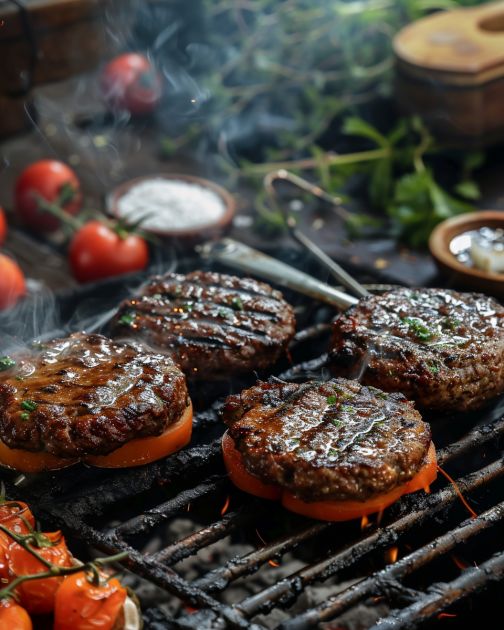Many people don’t realize that when and how they season the burger meat can make a big difference. You should add salt to your burgers just before they hit the grill or pan. Salting the meat too early can start to break down the proteins, leading to a drier texture because the salt will draw out moisture – the exact opposite of what you want. Make sure to season generously at the right moment for the best flavor without any moisture loss.
4) Cooking Method
A scorching hot surface is crucial for sealing in the juices. Restaurants often use flat-top griddles that provide consistent, even heat. At home, if you’re using a grill, make sure it’s preheated and hot before the burgers touch the grate. If pan-frying, the pan needs to be hot enough that you hear a sizzle when the patty makes contact. Cook your burgers on high heat for the minimum time necessary to reach the desired doneness, flipping only once if possible.
5) Doneness
Restaurants are generally quite adept at cooking burgers to the perfect level of doneness, which is often a nice medium to medium-rare for optimal juiciness. At home, it’s easy to fall into the trap of overcooking burgers, especially if you’re worried about food safety. Invest in a reliable meat thermometer and aim for an internal temperature of about 160°F for a fully cooked burger that is still juicy (the USDA recommendation), or slightly lower if you prefer them a bit rarer – just make sure you’re comfortable with the associated risks.
6) Resting the Burgers
Finally, even if you do everything else right, not allowing your burgers to rest after taking them off the heat can be a fatal misstep. Resting allows the juices to redistribute throughout the patty, rather than spilling out onto your plate the moment you cut into it. Give your burgers a few minutes to rest – just as you would with steak or other meats – before serving them.
By scrutinizing your choice of meat, the way you handle and season the patties, your cooking methods, your monitoring of doneness, and how you let burgers rest after cooking, you can diagnose where you might be going wrong. With a little practice and attention to these factors, you’ll be crafting burgers at home that are just as juicy – if not juicier – than those from your favorite burger joint. Say goodbye to the dry disappointments and hello to a new era of burger brilliance right in your own kitchen.

Burgers at joints are juicy, but mine are dry when I cook at home. What am I doing wrong?
ADVERTISEMENT
For Complete Cooking STEPS Please Head On Over To Next Page Or Open button (>) and don’t forget to SHARE with your Facebook friends
ADVERTISEMENT